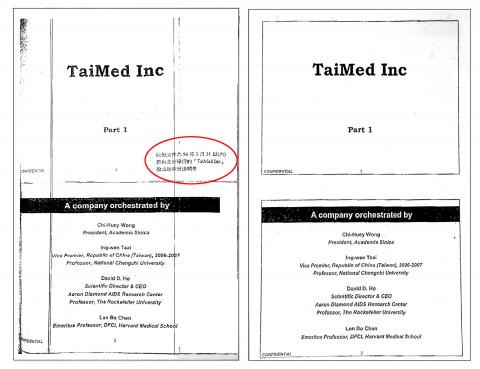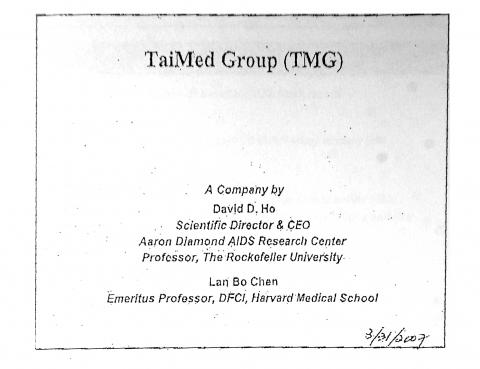The Democratic Progressive Party (DPP) yesterday described the controversy surrounding its presidential candidate Tsai Ing-wen’s (蔡英文) involvement with a biotechnology start-up as “Taiwan’s Watergate scandal,” claiming that administrative and judiciary agencies have been used as campaign tools to benefit the presidential campaign of the Chinese Nationalist Party (KMT).
The accusation came after the Supreme Prosecutors’ Office Special Investigation Division (SID) launched an investigation into the National Development Fund (NDF) on Tuesday night and seized information about three investment deals made between 2005 and 2008, when Tsai served as vice premier.
The DPP accused Council for Economic Planning and Development (CEPD) Minister Christina Liu (劉憶如) of being the KMT’s “hired thug” by fabricating documents to suggest Tsai’s wrongdoings in the formation of and the government’s investment in Yu Chang Biologics Co (宇昌生技股份有限公司).

Photos: Liberty Times
Yesterday afternoon, the DPP filed lawsuits with the Taipei District Prosecutors’ Office against Liu and KMT legislators Chiu Yi (邱毅), Hsieh Kuo-liang (謝國樑) and Lin Yi-shih (林益世), charging them with document forgery and violating the Presidential and Vice Presidential Election and Recall Act (總統副總統選舉罷免法).
The party also condemned what it called the SID’s collaboration with the KMT.
‘WATERGATE’

Photo: Liberty Times
“The case has now become Taiwan’s Watergate, a definite political scandal. We demand that President Ma Ying-jeou (馬英九) and the SID explain why they have resorted to the measure to influence the presidential election,” DPP spokesperson Chen Chi-mai (陳其邁) said.
Liu and the KMT on Monday accused the DPP chairperson of involvement in wrongdoings when they displayed a document that they said was distributed by TaiMed Group, from which Yu Chang Biologics was formed, at an investors’ conference on March 31, 2007, and said the presentation document listed Tsai as one of the principal leaders of the start-up during the time she was vice premier.
However, the document was actually a TaiMed Group presentation from Aug. 19, 2007 — three months after Tsai left office, the DPP said on Tuesday, but the KMT inserted additional information on the document copies provided to the media that indicated it had come from the March investors’ conference.
The DPP demanded a formal apology from Liu and the three KMT lawmakers.
While Liu apologized on Tuesday evening for “confusing the dates” of the document, her refusal to say the document had been fabricated was the reason behind the DPP’s decision to file the lawsuit, Chen said at a press conference.
Liu’s mistake was more than carelessly misstating the date, Chen said, as the document appeared to have been fabricated before Monday because Liu repeatedly said in the press conference that “the March 31 document” was important in determining Tsai’s role in the case.
At the press conference on Tuesday evening in which she ostensibly apologized, Liu said there were what she called “more questionable points” concerning the Yu Chang case, Chen added.
CAMPAIGN TIE-IN
In light of this, the DPP stepped up its claims of the behind-the-scenes political maneuvering by the KMT to benefit its presidential campaign.
“This is a case where the ruling party has exploited state institutions and attacked its opponent with fabricated information,” Chen said.
Citing news reports from various media outlets between Friday last week and Monday, Chen said an unidentified high-ranking KMT official had been quoted as saying that “Tsai could face legal issues if she played a specific role in the case.”
“This seemed to us a sophisticatedly plotted political conspiracy ... We want to identify who the official is and what the KMT’s motive is to politicize this case,” DPP spokesman Chuang Ruei-hsiung (莊瑞雄) said.
“Most people have by now become accustomed to the KMT’s “smear campaign trilogy of so-called whistleblowing, intensive media scrutiny and judicial oppression,” Chuang said.
“But we are surprised that the last part [judiciary oppression] came so quickly,” he said, adding that the SID might even try to summon DPP politicians, including Tsai, former premier Su Tseng-chang (蘇貞昌) and former council chairperson Ho Mei-yueh (何美玥), for questioning before election day.
At a separate setting in the afternoon, Liu confirmed the SID had arrived at the fund’s office a day earlier to retrieve documents related to the Yu Chang Biologics investment case.
The SID has also had access to the documents about two other companies — Taiwan Biopharmaceuticals Co (南華生技) and TaiMed Biotech Fund (台懋生技創投) — that had once applied for funding from the NFD on their “strange” connections with the Yu Chang deal, Liu added.
LIU’S REACTION
When asked for her reaction to being sued by the DPP, Liu said she had to confront it, but added that it was a political move on the DPP’s part.
“The things I have done were part of my responsibilities to the legislature and I have never violated administrative neutrality,” Liu said.
Meanwhile, the DPP yesterday also filed a lawsuit against Tsai Ling-yi (蔡令怡), wife of Premier Wu Den-yih (吳敦義), for allegedly spreading false statements and violating election laws.
At a KMT rally in Penghu on Sunday, Tsai Ling-yi said Tsai Ing-wen had transferred public funds of NT$1.1 billion (US$36.3 million) to the accounts of her family businesses, DPP spokesperson Kang Yu-cheng (康裕成) said.
Those comments violated election laws, which prohibit false statements for the purpose of getting a candidate elected or impeding a person’s election chances, Kang said.
Tsai Ling-yi said last night she “could have cited incorrect information.”
When asked by reporters whether she would apologize for the remark, she said: “If I have used incorrect information, I would apologize.”
Additional reporting by Amy Su

CHAOS: Iranians took to the streets playing celebratory music after reports of Khamenei’s death on Saturday, while mourners also gathered in Tehran yesterday Iranian Supreme Leader Ayatollah Ali Khamenei was killed in a major attack on Iran launched by Israel and the US, throwing the future of the Islamic republic into doubt and raising the risk of regional instability. Iranian state television and the state-run IRNA news agency announced the 86-year-old’s death early yesterday. US President Donald Trump said it gave Iranians their “greatest chance” to “take back” their country. The announcements came after a joint US and Israeli aerial bombardment that targeted Iranian military and governmental sites. Trump said the “heavy and pinpoint bombing” would continue through the week or as long

TRUST: The KMT said it respected the US’ timing and considerations, and hoped it would continue to honor its commitments to helping Taiwan bolster its defenses and deterrence US President Donald Trump is delaying a multibillion-dollar arms sale to Taiwan to ensure his visit to Beijing is successful, a New York Times report said. The weapons sales package has stalled in the US Department of State, the report said, citing US officials it did not identify. The White House has told agencies not to push forward ahead of Trump’s meeting with Chinese President Xi Jinping (習近平), it said. The two last month held a phone call to discuss trade and geopolitical flashpoints ahead of the summit. Xi raised the Taiwan issue and urged the US to handle arms sales to

State-run CPC Corp, Taiwan (CPC, 台灣中油) yesterday said that it had confirmed on Saturday night with its liquefied natural gas (LNG) and crude oil suppliers that shipments are proceeding as scheduled and that domestic supplies remain unaffected. The CPC yesterday announced the gasoline and diesel prices will rise by NT$0.2 and NT$0.4 per liter, respectively, starting Monday, citing Middle East tensions and blizzards in the eastern United States. CPC also iterated it has been reducing the proportion of crude oil imports from the Middle East and diversifying its supply sources in the past few years in response to geopolitical risks, expanding

Pro-democracy media tycoon Jimmy Lai’s (黎智英) fraud conviction and prison sentence were yesterday overturned by a Hong Kong court, in a surprise legal decision that comes soon after Lai was jailed for 20 years on a separate national security charge. Judges Jeremy Poon (潘兆初), Anthea Pang (彭寶琴) and Derek Pang (彭偉昌) said in the judgement that they allowed the appeal from Lai, and another defendant in the case, to proceed, as a lower court judge had “erred.” “The Court of Appeal gave them leave to appeal against their conviction, allowed their appeals, quashed the convictions and set aside the sentences,” the judges